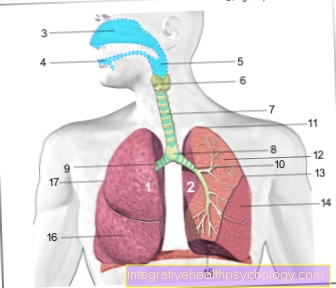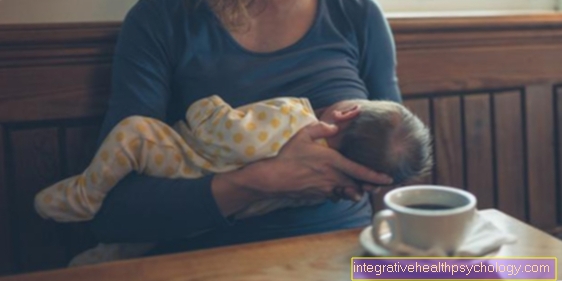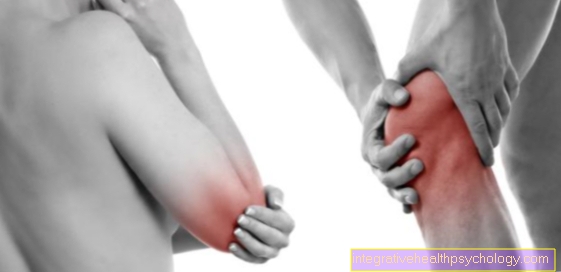Diarrhea in pregnancy
definition
In order to speak of diarrhea during pregnancy, certain criteria must be met.
It is called diarrhea if either more than three times a day is defecated or an increased amount of more than 200-250 g per day is passed. Another criterion for diarrhea is decreased stool consistency.
One speaks of chronic diarrhea during pregnancy if it lasts two to three weeks.

causes
As such, diarrhea is not a typical pregnancy problem. In general, pregnancy hormones are more likely to lead to mild constipation.
However, there are many pregnant women who occasionally complain of diarrhea.
Especially at the beginning of pregnancy, diarrhea can be due to a change in diet. Since a healthy diet is very important during pregnancy, many women change their diet and also consume foods that are rich in fiber. The intestine can initially react to the unfamiliar situation with diarrhea. Therefore a little patience is necessary, especially at the beginning of pregnancy. If the cause of the diarrhea is to be found in a change in diet, it usually just takes a little time for the body to get used to the new situation.
Read more on this topic at: Diet in Pregnancy
During pregnancy, symptoms such as diarrhea and constipation can be explained by the fact that the growing uterus presses on the intestines. This can lead to changing bowel habits. Psychological factors such as stress and nervousness also play a role.
Immediately before the due date, diarrhea can even be a harbinger of the beginning of the birth.
Apart from the pregnancy-related causes, all causes that lead to diarrhea outside of pregnancy can of course also come into question. These are, for example, infectious diseases, food intolerance or food poisoning, but also chronic inflammatory bowel diseases or irritable bowel syndrome.
Read more on this topic at: Causes of diarrhea
Infections with gastrointestinal viruses are not uncommon during pregnancy. However, you should consult a doctor, especially if you suspect a salmonella infection, as this can be dangerous during pregnancy.
diagnosis
In most cases, the diagnosis of diarrhea is made by the treating family doctor; of course, the gynecologist can also be used as a contact during pregnancy.
In order to clarify the cause, it is important to ask about accompanying symptoms, the frequency and duration of the diarrhea and any triggering factors. This can be, for example, a change in diet, contact with people with gastrointestinal flu or the consumption of spoiled food.
In this way, causes can be narrowed down.
Special pathogen diagnosis in the stool or blood is only rarely necessary. In the case of chronic diarrhea, further examinations are also necessary during pregnancy.
Concomitant symptoms
Diarrhea can be accompanied by other symptoms, depending on the underlying cause.
An infection of the gastrointestinal tract is often associated with nausea and vomiting or general symptoms such as fever and fatigue. With such symptoms, an infection is very likely even during pregnancy (please refer: Gastrointestinal infection).
Caution is advised if you suspect listeriosis. This infectious disease is also associated with vomiting and diarrhea, but it also leads to muscle pain and fever. Pregnant women have a 10 times higher risk of infection for Listeria than non-pregnant women. The disease can lead to premature birth or miscarriage and must therefore be treated.
Read more on this topic at: Infections in pregnancy
In general, mild diarrhea during pregnancy is often accompanied by constipation. This is due to the growing uterus pressing on the intestines.
Other diseases of the gastrointestinal tract, such as inflammatory bowel disease, manifest themselves in very specific symptoms. Sometimes this can even be joint problems or a fever. Such accompanying symptoms, however, are very dependent on the underlying disease and not specific to pregnancy.
If diarrhea lasts for several days, the loss of fluid can lead to circulatory problems in the pregnant woman.
A doctor should be consulted immediately, especially if you are tired, weak or even have blood in your stool.
Diarrhea and abdominal cramps
Abdominal cramps can also occur as part of diarrhea during pregnancy. A change in diet is often the reason for stomach cramps and diarrhea.
The fact that many pregnant women increasingly consume high-fiber healthy foods result in slight discomfort in the beginning during the acclimatization phase.
It is best to deal with these complaints with a little patience. The body needs some rest and time to adapt to the new circumstances.
Read more on this topic at: Abdominal cramps during pregnancy
However, abdominal cramps can also occur as part of an infectious gastrointestinal disease or another intestinal disease. It is a very unspecific symptom that cannot be assigned to a specific cause.
In particular, if you have persistent abdominal cramps and diarrhea or blood in your stool, you should urgently consult a doctor.
You can find an overview of other causes of abdominal pain during pregnancy at: Abdominal pain in pregnancy
Diarrhea and stomach cramps
Stomach cramps are similar to stomach cramps. They are usually an expression of a change in diet during pregnancy.
However, they can also occur as part of an infectious disease, food poisoning or other gastrointestinal disease.
Therefore, pregnant women should consult a doctor, especially if they have persistent stomach cramps and diarrhea.
Further information on this topic can be found at: Stomach cramps during pregnancy and Food poisoning symptoms
Diarrhea and vomiting
Vomiting is often not associated with mild diarrhea or constipation, especially in early pregnancy.
In contrast to diarrhea, vomiting and the accompanying nausea are among the more typical pregnancy symptoms and are also included under the term Hyperemesis gravidarum known (please refer: Vomiting during pregnancy).
This pregnancy sickness usually subsides by the 16th week of pregnancy. However, if vomiting is accompanied by severe diarrhea or even a fever, there is a high probability that it is an infection or food poisoning.
Read more on the subject under: Nausea in pregnancy
What are the dangers for the child?
Diarrhea, such as occurs as part of a viral gastrointestinal infection or a change in diet, usually does not harm the unborn child.
It is important to drink enough fluids to prevent dehydration.
However, some infectious diseases, such as listeria or salmonella, can harm the child and must therefore be urgently clarified, especially if the diarrhea persists or blood is in the stool.
Since persistent diarrhea can also lead to smear infections of the vagina, care should be taken not to contaminate the vagina with stool when using the toilet. Bacterial vaginosis can lead to miscarriages by triggering premature labor.
When do I have to see a doctor?
There are various warning signs and symptoms that you should definitely see a doctor.
Diarrhea that lasts longer than three days must be clarified by a doctor, otherwise it can lead to a high loss of fluid. In addition, infection should be excluded in this case.
Furthermore, a doctor must be consulted in the event of blood in the stool and general symptoms such as fever and circulatory problems.
Accompanying symptoms such as a foul-smelling vaginal discharge, vaginal bleeding or severe abdominal cramps should also be reported to a doctor immediately.
What to do if you have diarrhea during pregnancy
In addition to a visit to the doctor, there are measures that can be taken in the event of diarrhea during pregnancy.
The most important thing is to drink enough fluids. Light foods such as rusks, carrots, mashed potatoes and soups are also recommended. Bananas or mashed apples are also good foods for diarrhea. Chamomile tea and fennel tea calm the intestines and also help to alleviate the symptoms.
Acidic foods such as fruit juices, coffee and hard-to-digest meat, eggs, butter and milk should be avoided.
In addition, physical rest and rest are very important, especially during pregnancy, as stress also promotes the symptoms.
For more information, see: Diet for diarrhea
What medication can I take?
During pregnancy, one should be more cautious about taking medication. Medication should always be discussed with a doctor in order to prevent complications.
If you have diarrhea during pregnancy, it is especially important to drink a lot and eat light foods.
Medication for diarrhea should not be taken without consulting a doctor. A doctor will only prescribe a drug in exceptional cases.
Over-the-counter medications should also be avoided during pregnancy.
Duration
The diarrhea shouldn't last more than a few days. If the diarrhea persists, a doctor should be consulted, as otherwise complications from the loss of fluid threaten.
A smear infection can also lead to a bacterial infection of the vagina.
Especially diarrhea at the beginning of pregnancy usually never lasts for several days at a time.They occur more and more alternately with constipation.
Persistent diarrhea over several weeks is often a sign of gastrointestinal disease and in most cases is not related to pregnancy.
Can diarrhea be a sign of pregnancy?
Diarrhea is not a typical sign of pregnancy. The hormonal changes during pregnancy can cause constipation or even nausea and vomiting.
However, diarrhea is not a typical complaint. Therefore, diarrhea cannot be taken as a sign of pregnancy.
Since the most common diarrhea is more likely to be caused by a conscious change in diet in early pregnancy, the pregnancy is usually already known at this point.
You can find an overview of possible pregnancy signs at: Signs of pregnancy


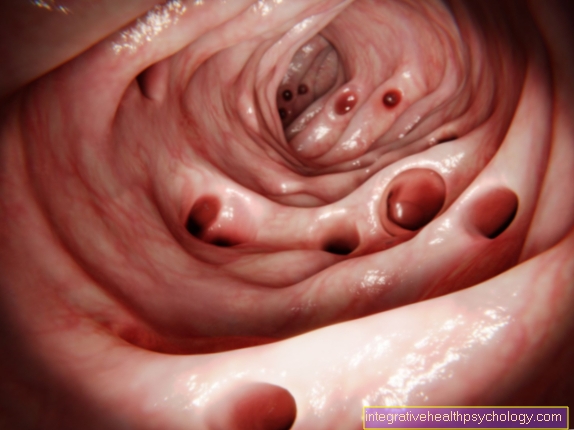






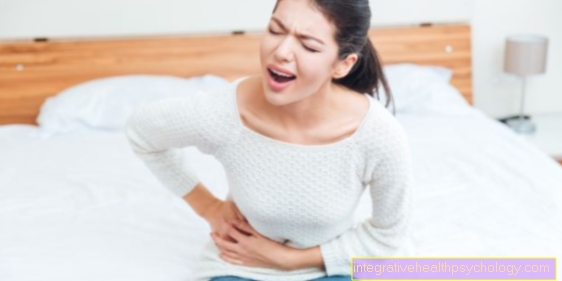
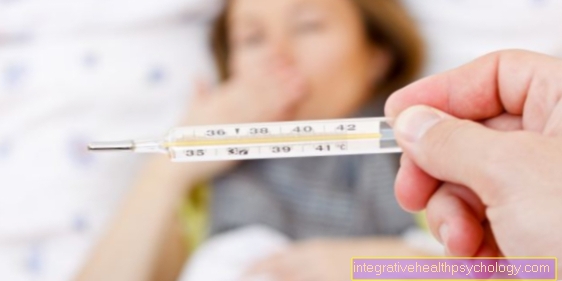
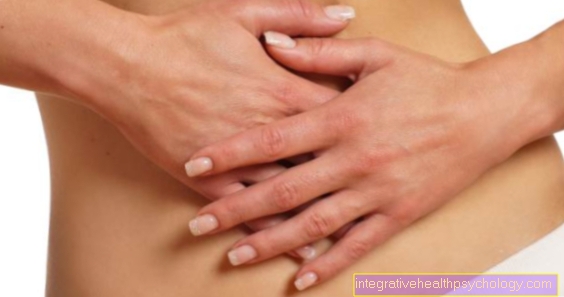
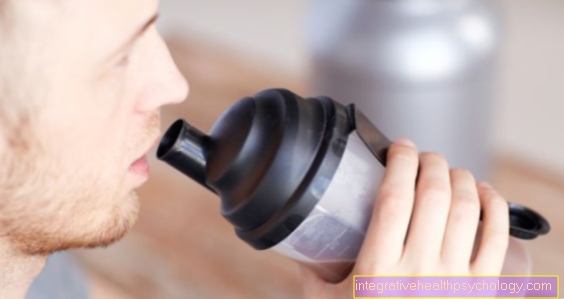


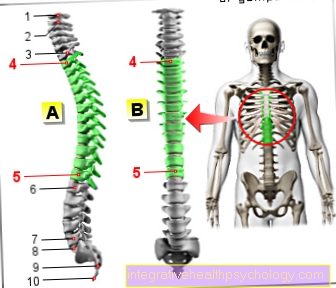
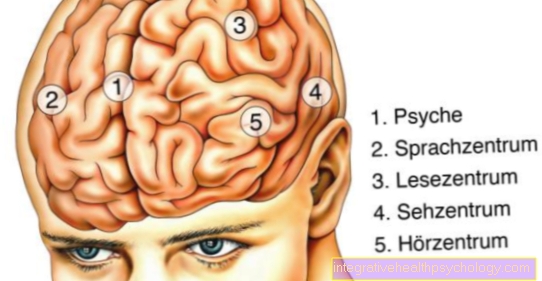
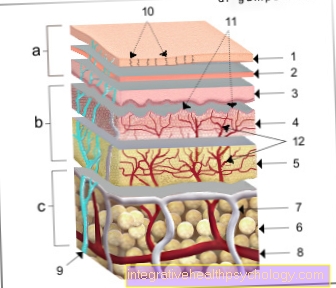








.jpg)
